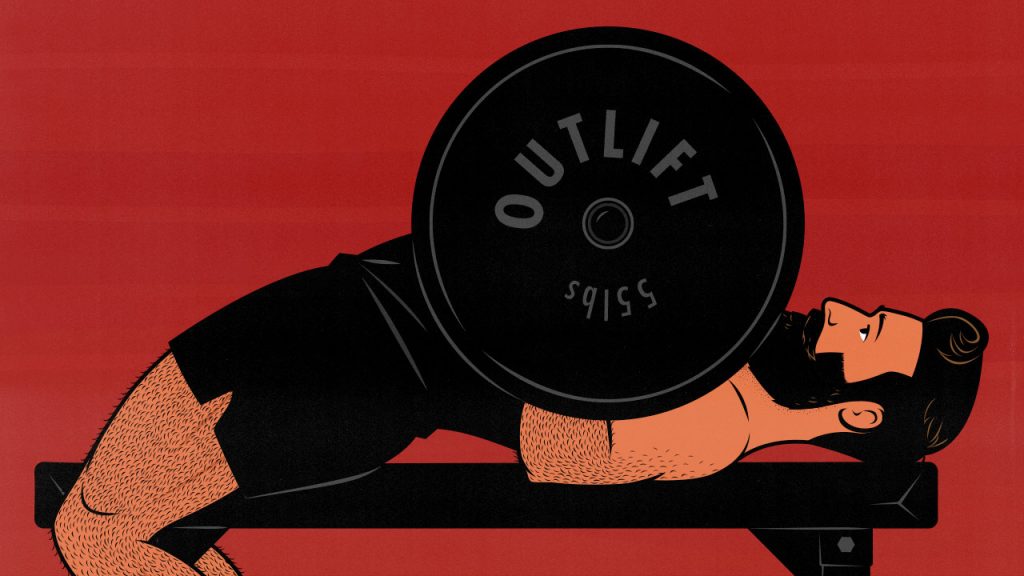
How Much Should You Be Able to Bench Press?
We surveyed 580 guys from our newsletter. Most guys start off benching less than 135 pounds. After a year of lifting weights, they can bench 135–224 pounds, which is the weight they plateau at forever. Most guys never load two plates on the bar.
We aren’t the only ones struggling to put up 225. Jared from Outlive pointed out that guys in elite tactical units, such as SWAT teams, bench 220 pounds on average (article).
That doesn’t mean you can’t bench 225. I think you can. I suspect your genetic limit is closer to three plates. But a two-plate bench is quite good, and it requires quite a bit of structured effort, especially if you’re naturally thin.
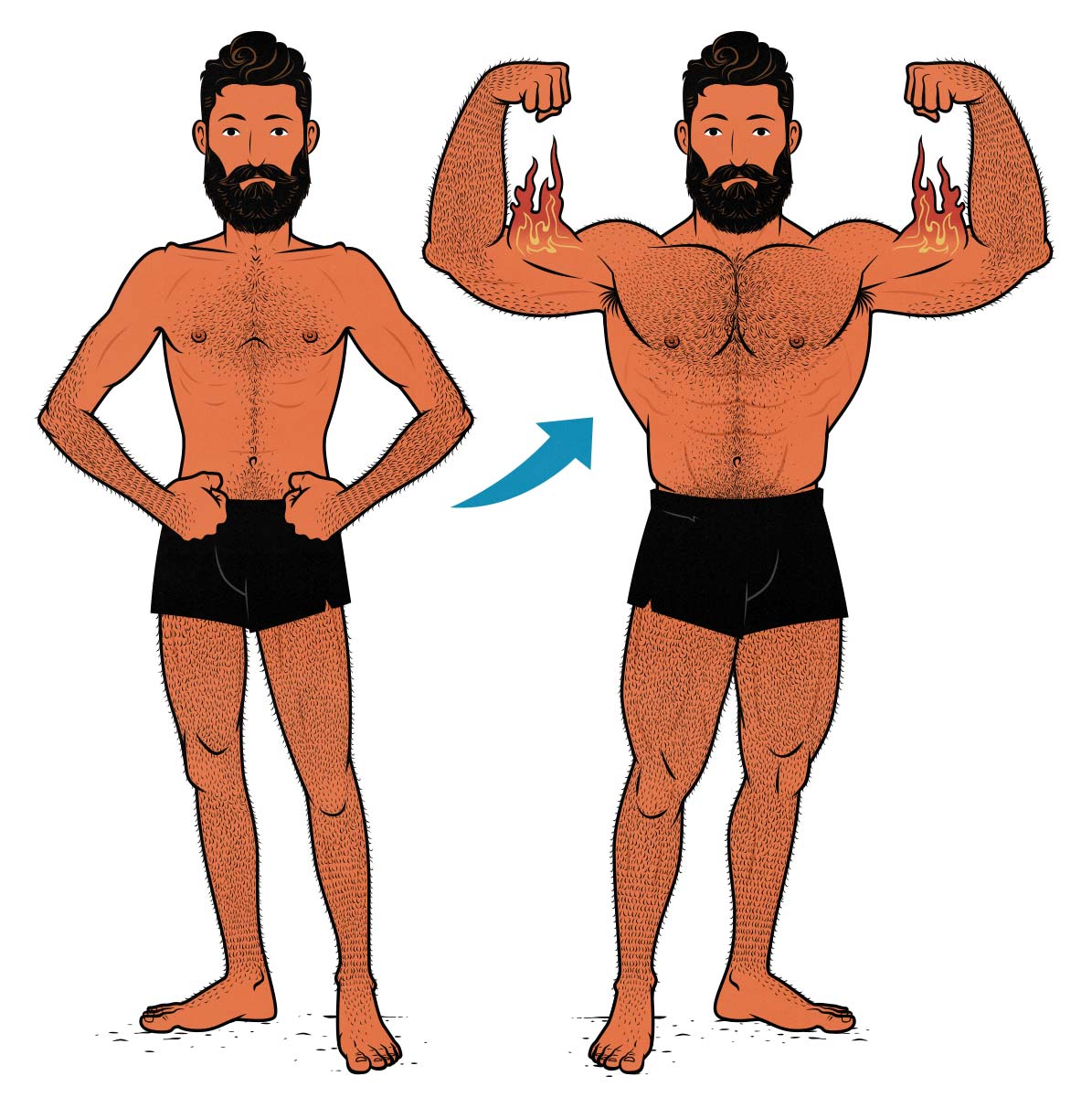
Introduction
I’ve noticed that strength standards on social media are inflated. The biggest and strongest guys rise to the top. On the other hand, most people who train at commercial gyms are casual lifters. Most haven’t gained any strength in years. It’s rare to someone load two plates on the bar and even rarer to see them do more than five reps with it.
Even that can be confusing. When you go to the gym, you see the guys who live there. After all, you’re three times as likely to see guys who train for six hours per week as guys who train for two hours per week.
I wanted to know what a respectable bench press was. I also wanted to know what was realistic for the average skinny guy. So, I surveyed our newsletter, which is full of naturally thin guys. If you aren’t naturally thin, I suspect you’ll start off stronger, have an easier time gaining weight, and eventually plateau at about the same place.
I’ll go year by year, giving examples along the way and then some recommendations at the end.
During Your First Year
60% of beginners bench less than 135 pounds during their first year of lifting weights. 38% bench between 135 and 224 pounds. Less than 1% can bench 225 during their first year.
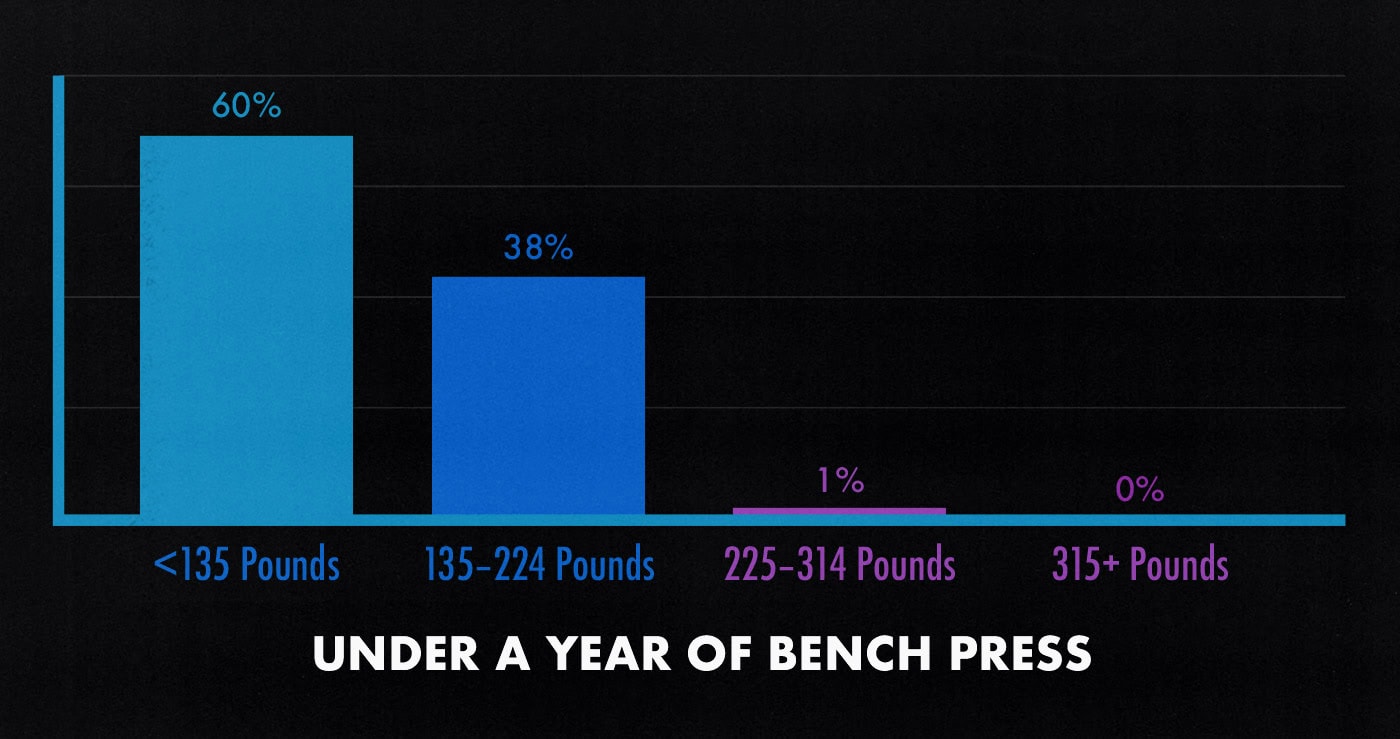
That means if you can lift 65–95 pounds for a few sets of 6–12 reps, you’re doing perfectly well. If you’re loading up 135+ pounds for your working sets, you’re doing much better than average.
When I was underweight, I started with push-ups. Once I could do ten, I added in the bench press, starting with 55 pounds for sets of 6 reps. I didn’t make it to 135 pounds during my first year, but I only spent four months bulking (and gained 20 pounds). After that bulk, I needed a break from eating so much food. When I stopped eating so much food, I stopped gaining strength.
After One Year
After a year of lifting weights, 56% of guys could bench more than 135 pounds, but only 5% could bench 225. A third of guys were still benching less than 135 pounds.
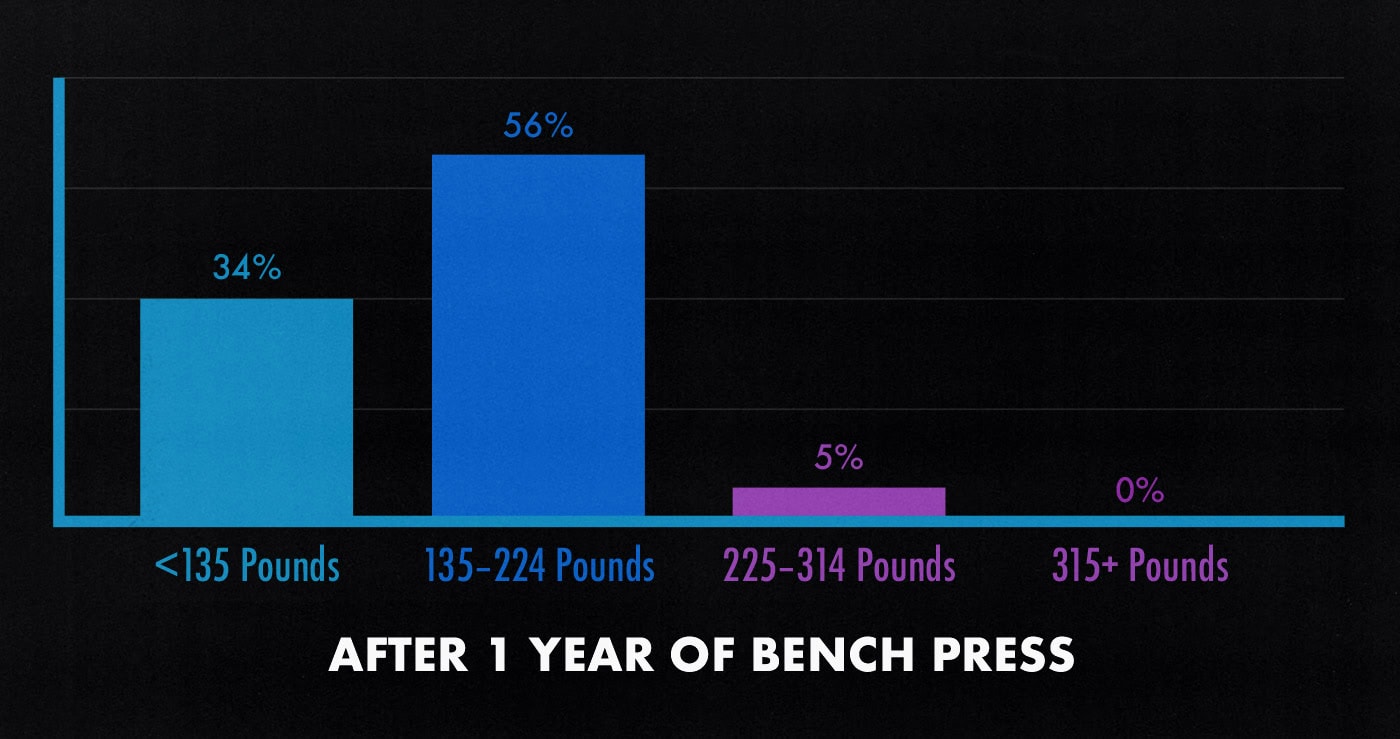
In your second year, I would aim to get past 135 pounds. You might even be able to bench 135 for sets of 6–12 reps.
After my first year, I bulked a second time, gaining another 17 pounds (+37 overall). By the end of that bulk, I was benching over 135 pounds for all my working sets.
After Three Years
After three years of lifting weights, 72% of guys could bench 135–224 pounds, and 16% could bench 225. Almost everyone had made it past 135 pounds. One person benched 315 pounds.
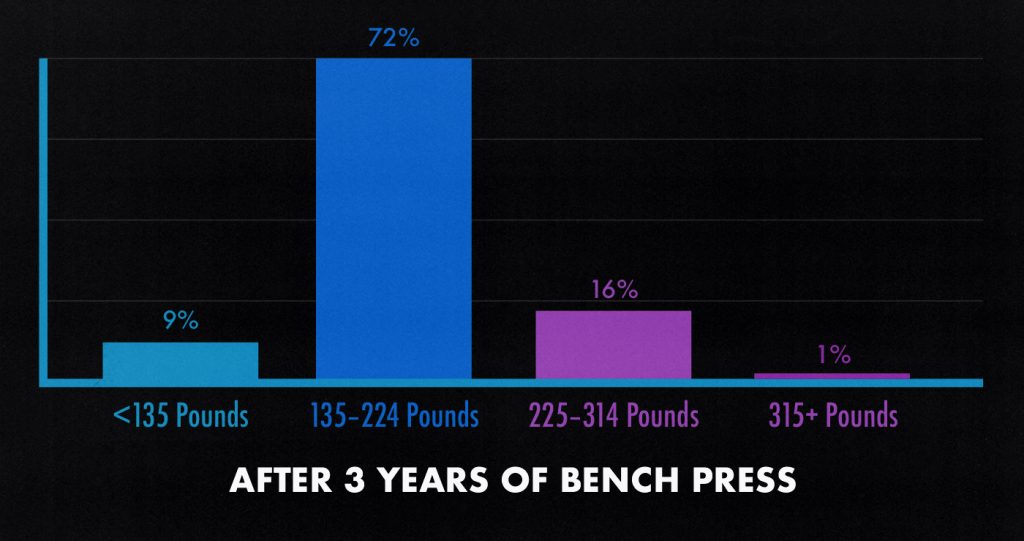
I would aim to bench 135 pounds for sets of 6–12 reps. If you can bench 225 pounds for any number of repetitions, you’re doing much better than average.
It took me a little over two years to bench 225 pounds. By then, I’d gained around 45 pounds. I also switched from hypertrophy training to strength training for a few months to get better at low-rep sets.
After Five Years
After 5 years, a third of guys could bench at least 225 pounds. Less than 1% could bench 315 pounds. That feels right. I’ve only ever seen one other person bench 315.
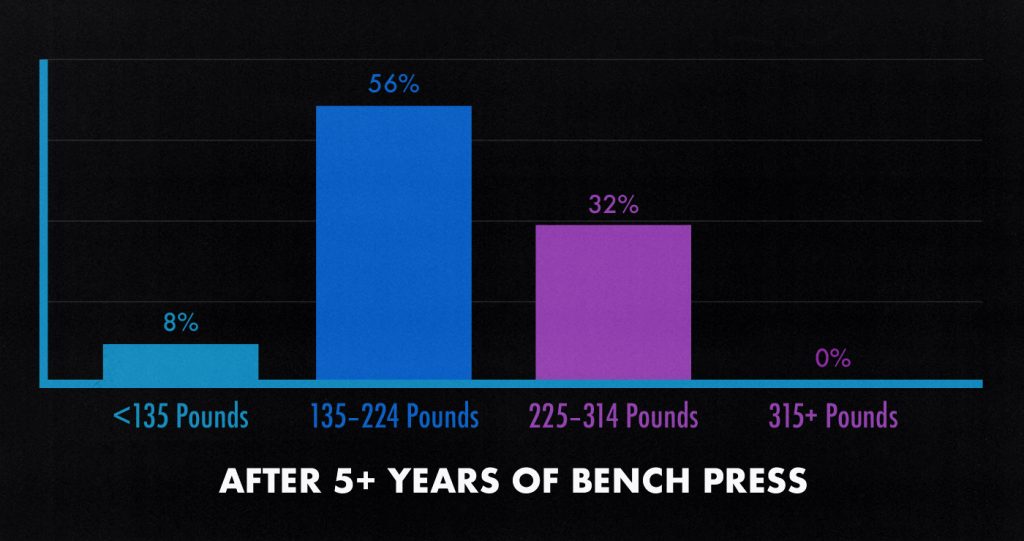
At this point, most people plateau. I know what skinny guys are like. We stop gaining strength because we get tired of bulking (because we get tired of eating). And once you’re a lean intermediate lifter, bulking is the only way to add a significant amount of weight to your bench press.
I run a fitness business, so I embarked on a few more bulks, eventually gaining a total of 70 pounds. By that point, I could comfortably bench 225 pounds for 15 repetitions. With a little bit more strength training, I managed to just barely eke out 315 for one.
To put that into context, Greg Nuckols found that his average male reader (mostly powerlifters) could bench press at least 315 within their first ten years of dedicated strength training (article). Mind you, the people most likely to be interested in powerlifting are naturally strong, and the ones most likely to stick with it are the ones who are especially good at it.
Conclusion
If you’re a skinny new lifter, you’ll probably be able to bench 45–95 pounds for 6–12 reps. After a year or two, you should be doing those sets with at least 135 pounds on the bar. That’s a totally normal bench press, and that’s a fine rate of progress. You’ll fit in just fine at any casual commercial gym. Most experienced lifters do their working sets with 135–200 pounds on the bar.
If you want a more impressive bench press, aim for at least a few casual reps with 225 pounds. If you can do your working sets with two plates on the bar, you’ll be much stronger than the average lifter, and you’ll earn the envious eye of most other guys in the gym.
If you want to fight closer to your genetic limit, 275 pounds is a good goal to strive for next. Once you can do that, you could aim for 315, but don’t expect to get there unless you’re willing to bulk and train like a powerlifter. Most guys who bench 315 are powerlifters weighing over 200 pounds.
Alright, that’s it for now. If you want another article like this one, I have similar articles about how much you should be able to squat, deadlift and overhead press, and also about how many push-ups and how many pull-ups you should be able to do.
Shane Duquette is the co-founder of Outlift, Bony to Beastly, and Bony to Bombshell. He's a certified conditioning coach with a degree in design from York University in Toronto, Canada. He's personally gained 70 pounds and has over a decade of experience helping over 10,000 skinny people bulk up.


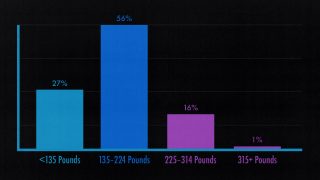

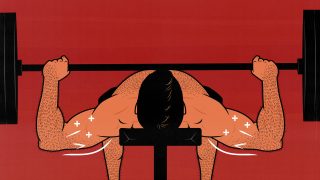
Great Shane! More of that. Lifting standards are indeed highly inflated. Especially if you look at most + 220 benches in a normal gym. Very rarely you see full range of motion. A crime I could call myself guilty of in my younger days.
Yeah, for sure. My first time benching 225 was with a towel rolled up on my chest because I thought I couldn’t safely go any deeper.
Nice article. What would be the equivalent to a 225 Pound barbell Bench Press when it comes to the dumbbell bench press? 90 pounds per dumbbell ?
Yes, I think so, but probably for more reps. The dumbbell bench press is always a bit lighter than the barbell bench press. It’s also much harder to do 1-rep maxes. If you can do your working sets with 90 pounds per hand, you’re doing great.
I could be wrong, but I think I was doing the dumbbell bench press with 90s for 8 reps when I was doing the barbell bench press with 225 for 4 reps.
Thanks for the reply! I only have dumbbells in my homegym and I am doing my working Sets With 35 kg (77 pounds) per Hand for 12 Clean Reps. At 69 kg bodyweight. I Hope I get there soon!
Another question I have is wether my strength correlates with my muscle mass? I think I am pretty strong, but still feel like I am somewhat small? I bulked from 49 kg up to 69 kg at the height of 172cm. Maybe it’s just some kind of body dysmorphia because other people say I look pretty fit. Would be a nice idea to cover some of these topics in future articles. Or maybe you already have and I have not seen them.
Cheers
35 kg for twelve reps is great! Even more impressive that you’ve gained TWENTY KILOS. Nice job, man!
Strength absolutely correlates with size. Different people have different leverages and muscle fibre types, so there are genetic components to it, but even so, the bigger you get, the stronger you’ll get. We have a full article on the relationship between strength and size.
You probably are quite fit, plenty strong, and in much better shape than the average person. You might even be bigger and stronger than the average athlete. But if you compare yourself to bodybuilders with great genetics who devote their lives to getting as big and lean as possible, the ones who will go to any lengths to get bigger, then you have no hope of living up to that extreme standard. Social media is full of those extreme people.
I’ve been thinking about muscle dysmorphia (a subset of body dysmorphia). It’s really common with lifters. It’s often called “bigorexia.” There’s a saying that the day you start lifting is the day you feel small forever. I have a couple of solutions for it. I want to think on it a bit more first, though. I’ll write an article and make a YouTube video soon. Stay tuned.
We live in pretty different worlds. I’m naturally fat and started training early. By 14 I could bench 225 and weighed like 160. By the end of highschool I was well into the 3s and ended up benching well into the 4s, but weighing almost 300. Ive seen dozens of guys do 315+ over the years.
At a our fire department of like 50 guys Ive seen 5 bench 315+, and probably 40 could do 225.
I suspect a fire department is sort of like an American football team, in a way, where it selects for the naturally strong and pushes them to get stronger. I think most guys of average genetics can get a 315 bench is they really work for it. I’m actually a little surprised that number isn’t higher. Though maybe that’s because there’s more of a focus on doing reps instead of singles?
Benching 400+, though, is a rare and impressive feat of strength. I’ve never seen anyone bench that much in real life. The most I’ve seen in a gym is maybe 325. Mind you, this was a regular gym for the general population. There weren’t any competitive bodybuilders or powerlifters training there.
Does your fire department have a gym of its own?
I used to work out when I was in my mid to late 20’s I never did know how much I could bench. I’m 35 now and started 3 months ago at first I couldn’t even do 1 rep of 2 plates now I can do 7-10 reps with a max pr of 255. Accomplished in only 3 months. I figure that’s very good and am very proud of that.
Benching 225 is a great feat. Most lifetime lifters never get there (not because it’s unrealistic but because it takes focused work). Being able to blast past it so early is awesome. Nice job, man!
My max is about 295 x2 and it felt heavy af haha
Yeah, definitely! That much weight pressing down on your arms, threatening to fall on your chest, is pretty intimidating. Feels heavy for sure.
295 for 2 is impressive, too. Nice job, Pablo.